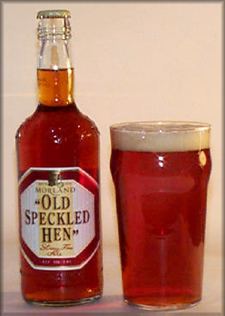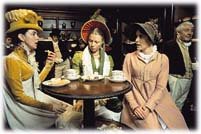We broke our previous greed record yesterday by consuming all of the peaches, bought at a farmers’ market on Sunday, that were supposed to last the week. Yum. So I thought I’d talk about peaches.
Peaches have been around for a long, long time, from China to Europe via the Silk Road, to America in the seventeenth century and into commercial production here in the nineteenth century. There were peaches at Pemberley:
The next variation which their visit afforded was produced by the entrance of servants with cold meat, cake, and a variety of all the finest fruits in season; but this did not take place till after many a significant look and smile from Mrs. Annesley to Miss Darcy had been given, to remind her of her post. There was now employment for the whole party; for though they could not all talk, they could all eat; and the beautiful pyramids of grapes, nectarines, and peaches soon collected them round the table. Pride and Prejudice
Back to early times, the Romans regarded peaches as a good mix with the savory (I’ve broiled pork chops with smushed up peaches, wine, and mint in my more carnivorous days and they were great). Here’s a recipe from Apicius, a collection of 4th- 5th century AD recipes which might be terrific. I don’t know … the Romans really loved their fish sauce, but really, fish sauce? Try at your own risk, Sister Mairi Jean’s Peaches in Cumin Sauce.
Jumping forward a few centuries–people like me should take note that King John of England died in 1216, some say from overindulging in peaches at a banquet nine days before. Here’s a recipe from 1597 for Peach Marmalade.
To make drie Marmelet of Peches.
Take your Peaches and pare them and cut them from the stones, and mince them very finely and steepe them in rosewater, then straine them with rosewater through a course cloth or Strainer into your Pan that you will seethe it in, you must have to every pound of peches halfe a pound of suger finely beaten, and put it into your pan that you do boile it in, you must reserve out a good quantity to mould your cakes or prints withall, of that Suger, then set your pan on the fire, and stir it til it be thick or stiffe that your stick wil stand upright in it of it self, then take it up and lay it in a platter or charger in prety lumps as big as you wil have the mould or printes, and when it is colde print it on a faire boord with suger, and print them on a mould or what know or fashion you will, & bake in an earthen pot or pan upon the embers or in a feate cover, and keep them continually by the fire to keep them dry. The Second Part of the Good Hus-wives Jewell, (1597); Thomas Dawson. From theoldfoodie.com
I couldn’t find a whole lot about peach recipes in England in the Regency period. There’s a possibility that quinces were more popular than peaches, according to historicfood.com (great pics here!). A lot of the historic recipes I did find were of the use them up quick variety and/or preserve them and if you’ve ever visited a pick your own orchard you’ll know exactly what I mean.
Closer to our own time, Thomas Jefferson embraced peach cultivation with enthusiasm, growing thirty-eight varieties at Monticello, compared to only two varieties at Washington’s Mount Vernon. Jefferson made mobby, an alcoholic drink from peaches, claiming that “20 bushels of peaches will make 75 galls. of mobby, i.e. 5/12 of its bulk” (The Fruits and Fruit Trees of Monticello. Peter J. Hatch).
I’m fascinated by the wealth of varieties of peaches. Peaches are peaches, right? Unless they’re white peaches or doughnut peaches, which do have distinctive flavors. William Cobbett commented, “It is curious enough that people in general think little of the sort in the case of peaches though they are so choice in the case of apples. A peach is a peach, it seems, though I know no apples between which there is more difference than there is between different sorts of peaches.” (Quoted in Hatch, above).
 Here are a couple of recipes from The Virginia Housewife by Mary Randolph, first published in 1825:
Here are a couple of recipes from The Virginia Housewife by Mary Randolph, first published in 1825:
Peaches in Brandy. Get yellow soft peaches, perfectly free from defect and newly gathered, but not too ripe; place them in a pot, and cover them with cold weak lye; turn over those that float frequently, that the lye may act equally on them; at the end of an hour take them out, wipe them carefully with a soft cloth to get off the down and skin, and lay them in cold water; make a syrup as for the apricots, and proceed in the same manner, only scald the peaches more.
Peach Marmalade. Take the ripest soft peaches, (the yellow ones make the prettiest marmalade,) pare them, and take out the stones; put them in the pan with one pound of dry light coloured brown sugar to, two of peaches: when they are juicy, they do not require water: with a silver or wooden spoon, chop them with the sugar; continue to do this, and let them boil gently till they are a transparent pulp, that will be a jelly when cold. Puffs made of this marmalade are very delicious.
And here’s a Peach Pudding recipe from later in the century, adapted from Recipes Tried and True, compiled by the Ladies’ Aid Society of the First Presbyterian Church, Marion, Ohio, 1894.
peaches, cooked and sweetened
pint sweet milk
4 eggs
1 cup sugar
1 Tablespoon butter
a little salt
1 teaspoon baking powder
2 cups flour
cream
Fill a pudding dish with peaches, cooked and sweetened; pour over them a batter made of one pint of sweet milk, four eggs, one cup of sugar, one tablespoon of butter, a little salt, one teaspoon of baking powder, and two cups of flour. Place in oven, and bake until a rich brown. Serve with cream.
The title of this post, by the way is from Andrew Marvell. I do love the phrase “stumbling on melons”, and if I’d discovered these lines sooner I might have blogged about melons:
The nectarine, and curious peach,
Into my hands themselves do reach;
Stumbling on melons, as I pass,
Ensnared with flowers, I fall on grass
What are your favorite peach recipes? Do share! I’m off downstairs where a bowl of fresh peaches awaits…
 Alfie Dolittle, who sings this in MY FAIR LADY, definitely would have agreed with Cobbett’s analysis of why beer is better than tea.
Alfie Dolittle, who sings this in MY FAIR LADY, definitely would have agreed with Cobbett’s analysis of why beer is better than tea. Here are a few of the terms to describe varieties and styles of real ale:
Here are a few of the terms to describe varieties and styles of real ale:



